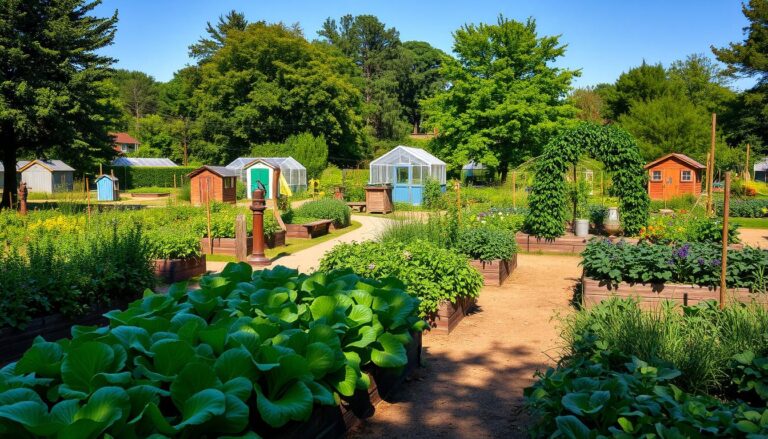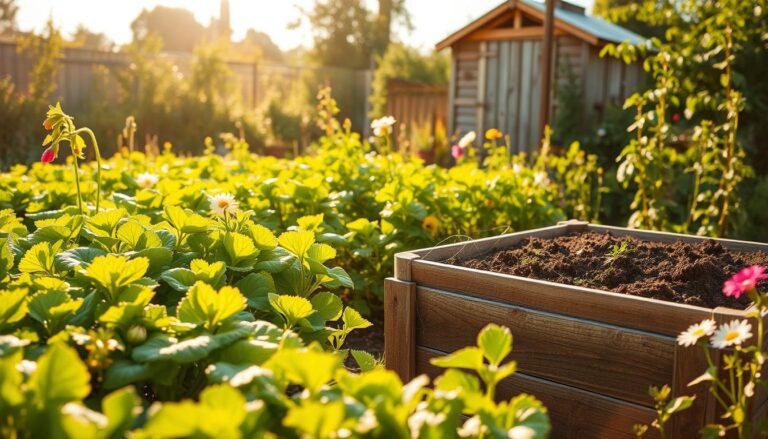To grow a thriving garden, you need more than just the right seeds. You must focus on the foundation: the quality of your soil. Using natural soil enhancers can greatly improve soil structure and support healthier plants. It also helps the environment.
By adding the right organic gardening soil amendments, you can make your garden’s ecosystem better. This not only helps your plants but also makes the environment healthier. In this guide, we’ll look at some top options to enhance your garden’s soil.
Understanding Soil Health and Why Amendments Matter
Healthy soil is key to a great garden. Knowing about soil health is important for gardeners. It affects how well plants grow, how much water they hold, and the garden’s overall health.
Signs Your Garden Soil Needs Improvement
There are signs your soil might need help. Look for poor drainage, compacted soil, and low fertility. If plants aren’t doing well, even with good care, it could mean the soil lacks nutrients.
Other signs include water pooling on the surface, slow plant growth, and more pests and diseases. Spotting these early can help you fix your soil’s health.
| Signs of Poor Soil Health | Description | Possible Solution |
|---|---|---|
| Poor Drainage | Water tends to pool on the surface. | Add organic amendments like compost. |
| Compacted Soil | Soil feels hard and dense. | Aerate the soil and add organic matter. |
| Low Fertility | Plants show signs of nutrient deficiency. | Fertilize with organic fertilizers. |
The Difference Between Organic and Synthetic Amendments
Organic amendments, like compost and manure, boost soil health. They add nutrients and improve soil structure. Unlike synthetic ones, they work well with nature, helping plants grow better.
Organic amendments give nutrients slowly, avoiding over-fertilization. They also help good microbes in the soil, which is vital. Synthetic amendments might fix problems quickly but can harm the soil’s balance over time.
Knowing the difference between organic and synthetic amendments helps gardeners choose the best way to improve their soil. This choice supports a healthy garden for the long term.
Essential Organic Gardening Soil Amendments for Nutrient-Rich Soil
The journey to a lush, vibrant garden starts with the soil. Organic soil amendments are key to improving soil health. They are more than just additives; they are the base of a thriving garden. By using these eco-friendly supplements, gardeners can boost soil fertility and health.
Compost: The Gold Standard
Compost is seen as the top choice for organic gardening. It’s packed with nutrients and improves soil structure. Adding compost to your garden gives plants a nutrient-rich diet, promoting healthy growth. Gardeners can make compost from kitchen scraps, leaves, and other organic materials.
Worm Castings: Nature’s Perfect Fertilizer
Worm castings, or vermicompost, are a powerful soil amendment. Worms break down organic matter to create nutrient-rich castings. These castings are full of nutrients and microbes that fight diseases and improve soil. Using worm castings can lead to healthier plants and bigger harvests.
Aged Manure: Slow-Release Nutrition
Aged manure is a slow-release fertilizer that feeds plants over time. It’s packed with nitrogen, phosphorus, and potassium, along with micronutrients. It also improves soil structure and supports beneficial microbes. Aged manure is a cost-effective, eco-friendly way to boost soil fertility.
| Amendment | Nutrient Content | Benefits |
|---|---|---|
| Compost | Rich in NPK and micronutrients | Improves soil structure, supports microbial activity |
| Worm Castings | High in nutrients and micro-nutrients | Fights plant diseases, improves soil health |
| Aged Manure | Rich in NPK | Slow-release nutrition, improves soil fertility |
Adding these organic soil amendments to your gardening routine can create a nutrient-rich environment. This supports healthy plant growth and sustainable gardening. Whether you’re new to gardening or experienced, using compost, worm castings, and aged manure can greatly improve your garden’s health and productivity.
Mineral-Based Organic Amendments for Soil Structure
Gardeners looking to make their soil better have found great help in mineral-based organic amendments. These natural helpers not only make the soil easier to work with but also feed plants what they need to grow.
These amendments come from nature and don’t have any man-made stuff in them. This makes them a top pick for those who garden organically. They help keep the soil healthy by making it better for plants to grow.
Rock Phosphate for Phosphorus Deficiency
Rock phosphate is a key mineral amendment for fixing phosphorus shortfalls in the soil. Phosphorus is vital for plants, helping with root growth, flower and fruit making, and overall plant health. It’s a slow-release source of phosphorus, giving plants a steady flow of this important nutrient.
Using rock phosphate boosts soil fertility, especially where phosphorus is low. It’s a natural way to help plants grow well without using synthetic fertilizers.
Greensand for Potassium and Trace Minerals
Greensand is another mineral amendment, packed with potassium and trace minerals. It’s made from ancient sea deposits and improves soil structure and fertility. As it breaks down, it slowly releases potassium and minerals, giving plants a steady supply of nutrients.
Greensand also helps the soil hold water better and breathe more easily. This is great for plants that need a lot of potassium, like those that make flowers and fruits.
Lime and Gypsum for pH Adjustment
Lime and gypsum are used to change the soil’s pH. Lime raises the pH of acidic soils, while gypsum improves soil structure without changing the pH much. Gypsum is especially good for clay soils, as it helps break up clay and improve drainage and aeration.
Getting the soil’s pH right is key for plants to get the nutrients they need. Most plants do best in slightly acidic to neutral soil. Using lime or gypsum can help get the pH just right, leading to healthier plants.
| Amendment | Nutrient Provided | Primary Use |
|---|---|---|
| Rock Phosphate | Phosphorus | Addressing phosphorus deficiency |
| Greensand | Potassium, Trace Minerals | Improving soil fertility and structure |
| Lime | Calcium | Raising soil pH |
| Gypsum | Calcium, Sulfur | Improving soil structure, pH adjustment |
Adding these mineral-based organic amendments to your gardening can really make your soil better. This leads to healthier plants and a more sustainable garden.
Plant-Based Amendments for Sustainable Gardening
Plant-based amendments are key to sustainable gardening. They give plants the nutrients they need and make the soil better. These natural helpers keep plants healthy and make gardening kinder to the planet.
Cover Crops and Green Manures
Cover crops and green manures boost soil health. They add organic matter, fight weeds, and stop soil erosion. Legumes like clover and beans are great because they fix nitrogen from the air, making the soil better for other plants.
Leaf Mold and Mulch
Leaf mold and mulch are also great for your garden. Leaf mold, made from old leaves, makes the soil better and more fertile. Mulch keeps the soil moist, stops weeds, and keeps the temperature right.
Benefits of Leaf Mold and Mulch:
- Improved soil structure and fertility
- Enhanced moisture retention
- Effective weed suppression
Alfalfa Meal and Kelp Products
Alfalfa meal is packed with nitrogen, phosphorus, and potassium. It’s great for growing healthy plants. Kelp products, made from seaweed, have lots of micronutrients and growth helpers. They make plants stronger and more productive.
| Amendment | Nutrient Content | Benefits |
|---|---|---|
| Cover Crops/Green Manures | Nitrogen, Organic Matter | Soil enrichment, weed suppression |
| Leaf Mold | Organic Matter, Micronutrients | Improved soil structure, fertility |
| Alfalfa Meal | N, P, K | Promotes healthy plant growth |
| Kelp Products | Micronutrients, Growth Stimulants | Enhances plant resilience, productivity |
How to Apply Organic Soil Amendments Effectively
Using organic soil amendments can really boost your soil and plants. To get the best results, follow a few important steps.
Testing Your Soil Before Adding Amendments
It’s key to test your soil before adding organic amendments. This tells you what nutrients and pH levels you have. It helps pick the right amendments and prevents too much fertilizer, which can hurt plants and the environment.
Timing Your Applications for Maximum Benefit
When to apply non-toxic soil additives matters a lot. It’s best to do it during the growing season or before planting. This lets the amendments break down and help plants when they need it most.
Application Rates and Methods
It’s important to follow the right application rates. Too much can cause nutrient imbalances, while too little won’t help much. You can apply amendments by mixing them into the soil, top-dressing, or using them as compost tea.
Common Mistakes to Avoid
Don’t skip soil testing before adding amendments. Also, avoid applying too much or too little, and don’t forget about timing. Steer clear of these mistakes to make the most of organic gardening soil amendments.
Creating Custom Soil Amendment Blends for Specific Plants
Gardeners can make special soil mixes for different plants. Each plant needs its own mix of nutrients, pH levels, and soil type. This way, gardeners can help plants grow strong and healthy.
Amendments for Vegetable Gardens
Vegetable gardens need soil that’s full of nutrients. Compost and worm castings are great because they have lots of nutrients. Rock phosphate helps with phosphorus, which veggies often lack.
Getting the nutrients right is key for a good harvest.
Amendments for Flowering Plants and Shrubs
Flowers and shrubs need special care to bloom well. Greensand adds potassium and minerals for flowers. Alfalfa meal and kelp products give extra nutrients for growth.
Amendments for Acid-Loving Plants
Plants like azaleas and blueberries love acidic soil. To help, use peat moss or elemental sulfur to make the soil acidic. Acidic compost keeps the soil right and feeds the plants.
Custom soil mixes help plants grow better. This method is good for the environment and makes plants happy and healthy.
Conclusion: Building Healthy Soil for a Thriving Garden
Starting a thriving garden begins with healthy soil. Organic gardening soil amendments are key to achieving this. Natural additives like compost, worm castings, and minerals improve soil structure and nutrient levels. They also boost beneficial microbes.
Using organic soil amendments has long-term benefits for our environment. As gardeners, we can support eco-friendly practices. This helps increase biodiversity, saves water, and cuts down on synthetic fertilizers.
With this guide, gardeners can start building healthy soil. First, check your soil’s needs. Then, pick the right organic amendments and use them well. Over time, your garden will grow, and you’ll enjoy a rich harvest and a greener gardening practice.
FAQ
What are the benefits of using organic soil amendments in my garden?
How do I know if my soil needs organic amendments?
What is the difference between organic and synthetic soil amendments?
How often should I apply organic soil amendments?
Can I make my own organic soil amendments at home?
Are organic soil amendments safe for all plants?
How do I choose the right organic soil amendment for my plants?
Can I use organic soil amendments in conjunction with other gardening practices like mulching or cover cropping?

Sortemdia nasceu com o propósito de trazer alegria e oportunidades para todos por meio de sorteios gratuitos de prêmios incríveis. O site tem como missão oferecer experiências acessíveis, divertidas e justas para quem deseja concorrer a produtos, serviços e brindes sem pagar nada por isso. Acreditamos que a sorte pode bater à porta de qualquer pessoa — e no Sortemdia, ela pode chegar com apenas um clique.



